一般疑问句的宾语从句
宾语从句的三种类型
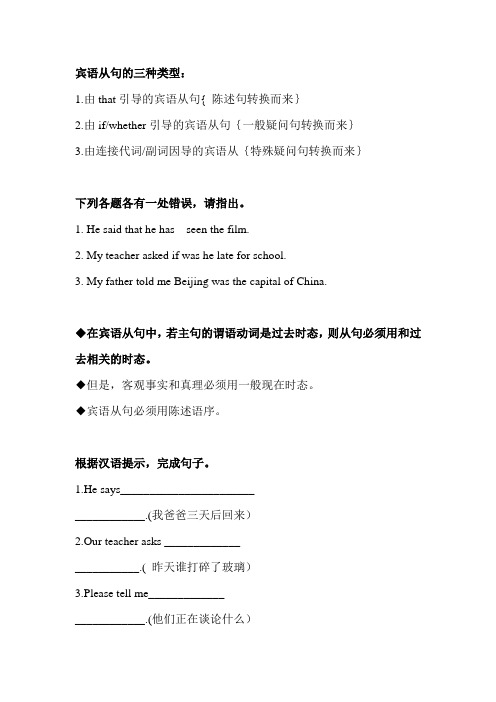
宾语从句的三种类型:1.由that引导的宾语从句{ 陈述句转换而来}2.由if/whether引导的宾语从句{一般疑问句转换而来}3.由连接代词/副词因导的宾语从{特殊疑问句转换而来}下列各题各有一处错误,请指出。
1. He said that he has seen the film.2. My teacher asked if was he late for school.3. My father told me Beijing was the capital of China.◆在宾语从句中,若主句的谓语动词是过去时态,则从句必须用和过去相关的时态。
◆但是,客观事实和真理必须用一般现在时态。
◆宾语从句必须用陈述语序。
根据汉语提示,完成句子。
1.He says___________________________________.(我爸爸三天后回来)2.Our teacher asks ________________________.( 昨天谁打碎了玻璃)3.Please tell me_________________________.(他们正在谈论什么)1.在宾语从句中,若主句的谓语动词是一般现在时态,从句可根据需要用任何时态。
2.宾语从句必须用陈述语序。
请完成以下宾语从句。
• 1. The tickets are in my pocket. The man said.•The man said___________________• 2. I have joined the League. He said.•He said________________________• 3. The earth goes round the sun. Our teacher told us.Our teacher told us_________________________________________4. Have you heard of anything about Mei? The man asked us.The man asked us_____________________________________5.Can you swim? Please tell me.Please tell me_________________6. How can we do the work well?I always think of.I always think of ___________________________________________中考考场( )35 、Some of my friends are interested in science,but none of them can tell _______? (2010河南)A when UFOs will appear next timeB why do horses know the wayC where was this kind of plant foundD how do elephants communicate( ) 35. I didn’t see Laura at the party last night. Do you know _______?(2011河南)A. why didn’t she comeB. what happenedC. when would she arriveD. where she has been中考考场( )35.My pen pal from America is coming to visit me. I’m thinking about_____. (2012河南)A. what present did give herB. how I will give her a surpriseC. where will we have a big mealD. whether I planned a trip for her()35.----Miss Lee,Ididn’t catch what you said,Could you tell me ____ again?----OK!(2013河南)A. what should we takeB.where shall we meetC.when we would startD.how we will get there 2014年中考预测()1、Your T-shirt is so cool. Could you tell me ________?A. where you buy itB. where do you buy itC. where you bought itD. where did youbuy it()2、—Do you know ________the new mobile phone last week?--Maybe 900 yuan. I’m not quite sure.A. how much she paid forB. how much will she pay forC. how much did she pay forD. how much would she pay for---What time will Mr. Brown be back to China?---Sorry. I don’t know ________.A. when did he go abroadB. why he is going abroadC. how soon will he be backD. how long he will stay abroad 宾语从句要点•1、引导词•2、时态•3、语序•4、语态。
宾语从句讲解
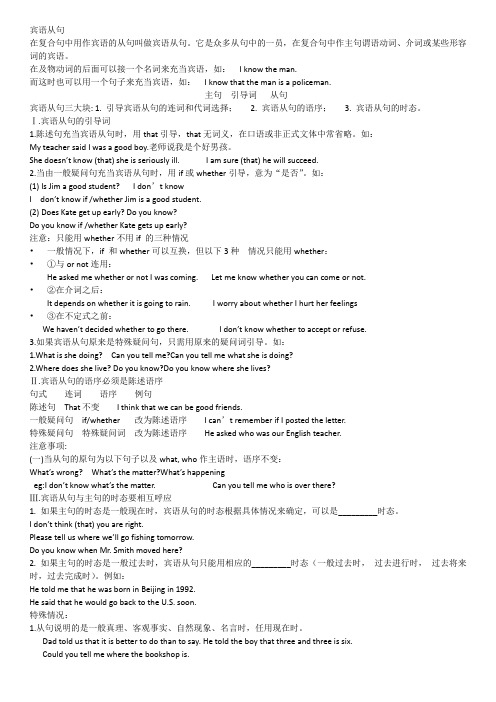
宾语从句在复合句中用作宾语的从句叫做宾语从句。
它是众多从句中的一员,在复合句中作主句谓语动词、介词或某些形容词的宾语。
在及物动词的后面可以接一个名词来充当宾语,如:I know the man.而这时也可以用一个句子来充当宾语,如:I know that the man is a policeman.主句引导词从句宾语从句三大块: 1. 引导宾语从句的连词和代词选择; 2. 宾语从句的语序; 3. 宾语从句的时态。
Ⅰ.宾语从句的引导词1.陈述句充当宾语从句时,用that引导,that无词义,在口语或非正式文体中常省略。
如:My teacher said I was a good boy.老师说我是个好男孩。
She doesn’t know (that) she is seriously ill. I am sure (that) he will succeed.2.当由一般疑问句充当宾语从句时,用if或whether引导,意为“是否”。
如:(1) Is Jim a good student? I don’t knowI don’t know if /whether Jim is a good student.(2) Does Kate get up early? Do you know?Do you know if /whether Kate gets up early?注意:只能用whether不用if 的三种情况•一般情况下,if 和whether可以互换,但以下3种情况只能用whether:•①与or not连用:He asked me whether or not I was coming. Let me know whether you can come or not.•②在介词之后:It depends on whether it is going to rain. I worry about whether I hurt her feelings•③在不定式之前:We haven’t decided whether to go there. I don’t know whether to accept or refuse.3.如果宾语从句原来是特殊疑问句,只需用原来的疑问词引导。
(全)初中英语-巧变宾语从句
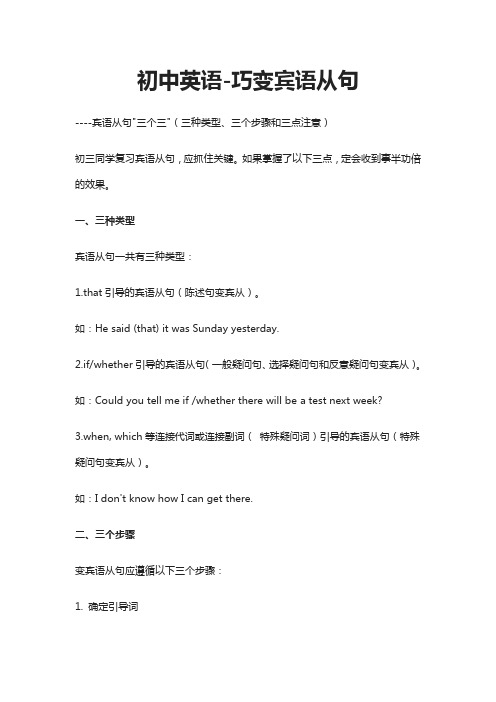
初中英语-巧变宾语从句----宾语从句"三个三"(三种类型、三个步骤和三点注意)初三同学复习宾语从句,应抓住关键。
如果掌握了以下三点,定会收到事半功倍的效果。
一、三种类型宾语从句一共有三种类型:1.that引导的宾语从句(陈述句变宾从)。
如:He said (that) it was Sunday yesterday.2.if/whether引导的宾语从句(一般疑问句、选择疑问句和反意疑问句变宾从)。
如:Could you tell me if /whether there will be a test next week?3.when, which等连接代词或连接副词(特殊疑问词)引导的宾语从句(特殊疑问句变宾从)。
如:I don't know how I can get there.二、三个步骤变宾语从句应遵循以下三个步骤:1. 确定引导词根据从句的句子类型选择正确的引导词:如从句为陈述句则引导词为that(that 在口语中常省略);如从句是一般疑问句、选择疑问句或反意疑问句,则引导词为if或whether;如从句是特殊疑问句,则引导词为特殊疑问词本身。
2. 调整语序宾语从句永远是陈述句语序。
如原句是疑问句,则应调整为陈述句语序。
如:1) Is he going to the shop? I want to know. (改为宾语从句)I want to know if/whether he is going to the shop.2) When does he get up? Do you know? (改为宾语从句)Do you know when he gets up?3. 变换时态A. 如主句动词是一般现在时或一般将来时,则宾语从句根据实际情况用所需要的任何时态。
如:1) He says (that) he will finish the work tomorrow.2) I think (that) they have already gone to Beijing.B. 如主句动词是一般过去时,则宾语从句动词的时态用过去时的某种形式(如,一般过去时、过去进行时、过去完成时、过去将来时等。
简单句变宾语从句
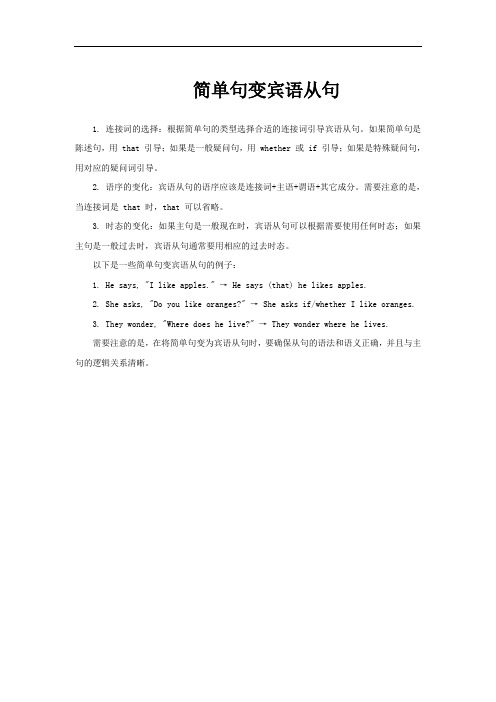
简单句变宾语从句
1. 连接词的选择:根据简单句的类型选择合适的连接词引导宾语从句。
如果简单句是陈述句,用 that 引导;如果是一般疑问句,用 whether 或 if 引导;如果是特殊疑问句,用对应的疑问词引导。
2. 语序的变化:宾语从句的语序应该是连接词+主语+谓语+其它成分。
需要注意的是,当连接词是 that 时,that 可以省略。
3. 时态的变化:如果主句是一般现在时,宾语从句可以根据需要使用任何时态;如果主句是一般过去时,宾语从句通常要用相应的过去时态。
以下是一些简单句变宾语从句的例子:
1. He says, "I like apples." → He says (that) he likes apples.
2. She asks, "Do you like oranges?" → She asks if/whether I like oranges.
3. They wonder, "Where does he live?" → They wonder where he lives.
需要注意的是,在将简单句变为宾语从句时,要确保从句的语法和语义正确,并且与主句的逻辑关系清晰。
宾语从句怎么区分是由一般疑问句转化而来还是特殊疑问句转化而来
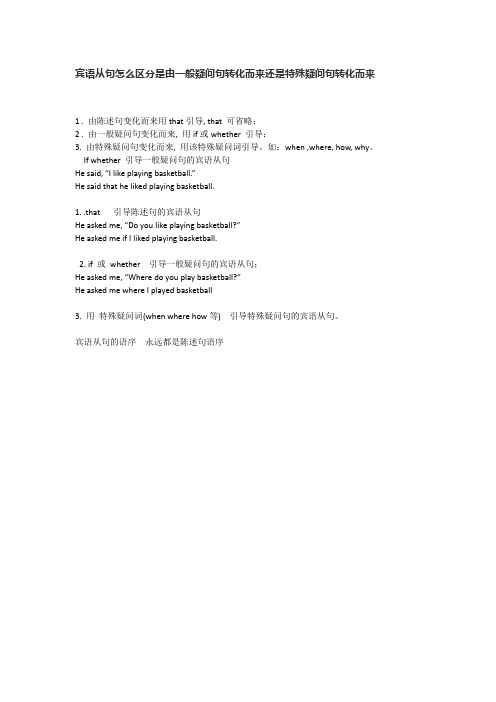
宾语从句怎么区分是由一般疑问句转化而来还是特殊疑问句转化而来
1 . 由陈述句变化而来用that引导, that 可省略;
2 . 由一般疑问句变化而来, 用if或whether 引导;
3. 由特殊疑问句变化而来, 用该特殊疑问词引导。
如:when ,where, how, why。
If whether 引导一般疑问句的宾语从句
He said, “I like playing basketball.”
He said that he liked playing basketball.
1. .that 引导陈述句的宾语从句
He asked me, “Do you like playing basketball?”
He asked me if I liked playing basketball.
2. if 或whether 引导一般疑问句的宾语从句;
He asked me, “Where do you play basketball?”
He asked me where I played basketball
3. 用特殊疑问词(when where how等) 引导特殊疑问句的宾语从句。
宾语从句的语序永远都是陈述句语序。
英语宾语从句(大完结)
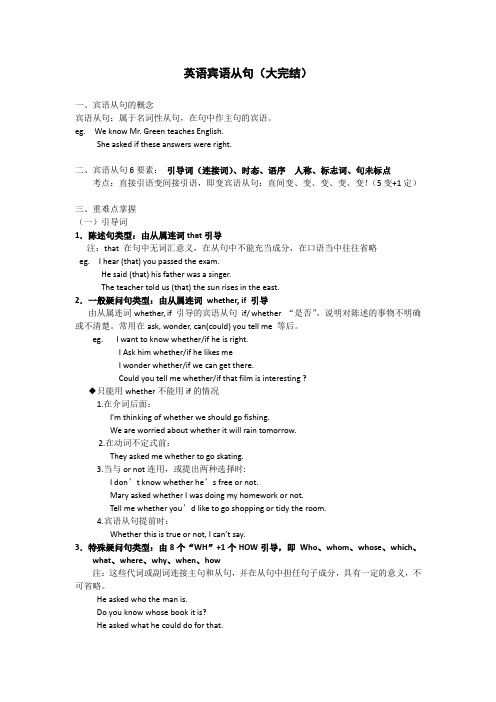
英语宾语从句(大完结)一、宾语从句的概念宾语从句:属于名词性从句,在句中作主句的宾语。
eg. We know Mr. Green teaches English.She asked if these answers were right.二、宾语从句6要素:引导词(连接词)、时态、语序人称、标志词、句未标点考点:直接引语变间接引语,即变宾语从句:直间变、变、变、变、变!(5变+1定)三、重难点掌握(一)引导词1.陈述句类型:由从属连词that引导注:that 在句中无词汇意义,在从句中不能充当成分,在口语当中往往省略eg.I hear (that) you passed the exam.He said (that) his father was a singer.The teacher told us (that) the sun rises in the east.2.一般疑问句类型:由从属连词whether, if 引导由从属连词whether, if 引导的宾语从句if/ whether “是否”,说明对陈述的事物不明确或不清楚。
常用在ask, wonder, can(could) you tell me 等后。
eg. I want to know whether/if he is right.I Ask him whether/if he likes meI wonder whether/if we can get there.Could you tell me whether/if that film is interesting ?◆只能用whether不能用if的情况1.在介词后面:I’m thinking of whether we should go fishing.We are worried about whether it will rain tomorrow.2.在动词不定式前:They asked me whether to go skating.3.当与or not连用,或提出两种选择时:I don’t know whether he’s free or not.Mary asked whether I was doing my homework or not.Tell me whether you’d like to go shopping or tidy the room.4.宾语从句提前时:Whether this is true or not, I can’t say.3.特殊疑问句类型:由8个“WH”+1个HOW引导,即Who、whom、whose、which、what、where、why、when、how注:这些代词或副词连接主句和从句,并在从句中担任句子成分,具有一定的意义,不可省略。
一般疑问句宾语从句

一般疑问句宾语从句
一般疑问句宾语从句可用于询问一个问题或事实的情况,例如:
•你知道他什么时候回来吗?(宾语从句是"他什么时候回来")
•你听说他们要搬家了吗?(宾语从句是"他们要搬家了")
•你能告诉我今天上课时间有没有改变?(宾语从句是"今天上课时间有没有改变")
在这些例子中,宾语从句一般由一个疑问词或连接词引导,例如"什么时候"、"是否"、"怎么样"等。
注意,在一般疑问句中,主语和助动词也需要颠倒位置,使其成为问句形式。
宾语从句详细讲解(整理)
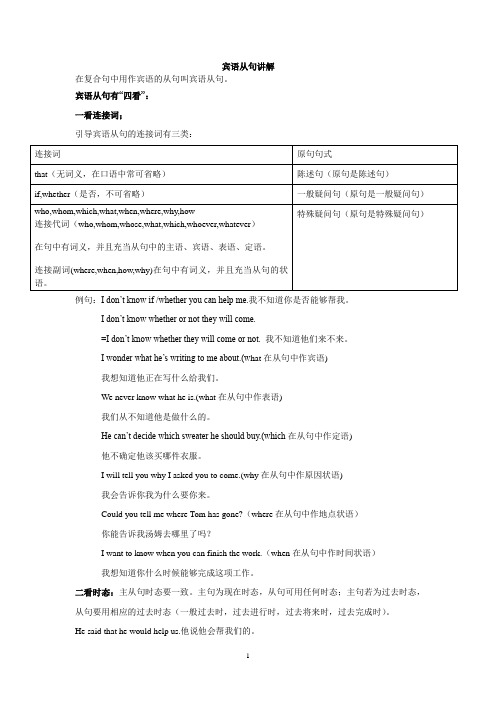
宾语从句讲解在复合句中用作宾语的从句叫宾语从句。
宾语从句有“四看”:一看连接词;引导宾语从句的连接词有三类:例句:I don’t know if /whether you can help me.我不知道你是否能够帮我。
I don’t know whether or not they will come.=I don’t know whether they will come or not. 我不知道他们来不来。
I wonder what he’s writing to me about.(w hat在从句中作宾语)我想知道他正在写什么给我们。
We never know what he is.(what在从句中作表语)我们从不知道他是做什么的。
He can’t decide which sweater he should buy.(which在从句中作定语)他不确定他该买哪件衣服。
I will tell you why I asked you to come.(why在从句中作原因状语)我会告诉你我为什么要你来。
Could you tell me where Tom has gone?(where在从句中作地点状语)你能告诉我汤姆去哪里了吗?I want to know when you can finish the work.(when在从句中作时间状语)我想知道你什么时候能够完成这项工作。
二看时态:主从句时态要一致。
主句为现在时态,从句可用任何时态;主句若为过去时态,从句要用相应的过去时态(一般过去时,过去进行时,过去将来时,过去完成时)。
He said that he would help us.他说他会帮我们的。
I didn’t know what he had done.我不知道他干了什么事。
注意:若从句表达的是客观事实或真理,从句用现在时态。
I didn’t know that light travels faster than sound.我以前不知道光比声音传播得快。
一般疑问句变成宾语从句的方法
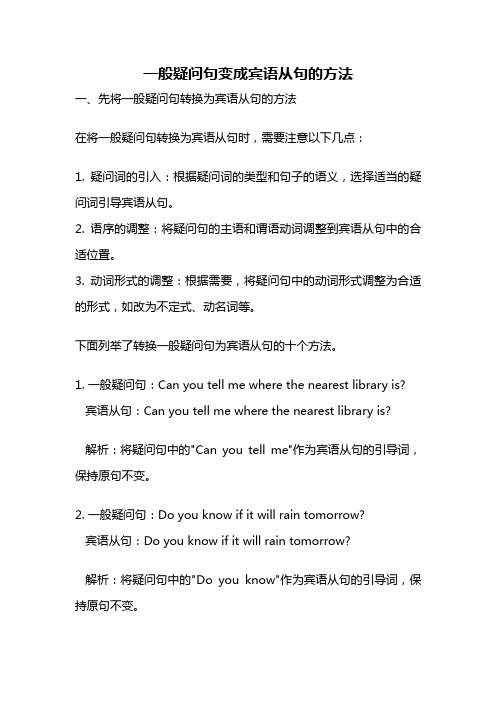
一般疑问句变成宾语从句的方法一、先将一般疑问句转换为宾语从句的方法在将一般疑问句转换为宾语从句时,需要注意以下几点:1. 疑问词的引入:根据疑问词的类型和句子的语义,选择适当的疑问词引导宾语从句。
2. 语序的调整:将疑问句的主语和谓语动词调整到宾语从句中的合适位置。
3. 动词形式的调整:根据需要,将疑问句中的动词形式调整为合适的形式,如改为不定式、动名词等。
下面列举了转换一般疑问句为宾语从句的十个方法。
1. 一般疑问句:Can you tell me where the nearest library is?宾语从句:Can you tell me where the nearest library is?解析:将疑问句中的"Can you tell me"作为宾语从句的引导词,保持原句不变。
2. 一般疑问句:Do you know if it will rain tomorrow?宾语从句:Do you know if it will rain tomorrow?解析:将疑问句中的"Do you know"作为宾语从句的引导词,保持原句不变。
3. 一般疑问句:Did she ask you what time the meeting starts?宾语从句:Did she ask you what time the meeting starts?解析:将疑问句中的"Did she ask you"作为宾语从句的引导词,保持原句不变。
4. 一般疑问句:Could you tell me how to get to the train station?宾语从句:Could you tell me how to get to the train station?解析:将疑问句中的"Could you tell me"作为宾语从句的引导词,保持原句不变。
宾语从句的结构和用法

宾语从句的结构和用法1.宾语从句在句中作及物动词或介词的宾语,从句放在主句之后,前后不用逗号分开。
2.引导宾语从句的词有:连词that(在口语中that常可省略),if, whether,如:He knows that Jim will work hard.连接代词who, whom, which等,如:Do you know who (whom) they are waiting for?连接副词when, where, how, why等,如:Could you tell me how we can get to the station?3.whether和if都有“是否”的意思,一般情况下两者可以换用,但在介词之后,不定式之前,与or not连用,在句首或在引导表语从句,同位语从句时,只能用whether,如:I want to know if/whether the news is true. He doesn't know whether to stay or not?4.宾语从句要用陈述句语序。
5.宾语从句一定要注意时态呼应,即:当主句谓语动词是过去式时,从句中谓语动词也要用过去范畴的时态,但若从句陈述的是真理或客观规律,其谓语的时态仍用一般现在时,如:He asked who could answer the question.My father told me that the earth goes around the sun.6.一个宾语从句只能用一个连词。
7.当主句谓语动词是think, believe等动词时,宾语从句的否定意义要放到主句中。
另外,当主句主语为第一人称时,后面若接附加疑问句,那么附加疑问句的主语、谓语应与从句中的主谓语保持一致。
如:I don't think he looks like his father, does he?8.直接引语和间接引语也是宾语从句,直接引语是引述别人的原话,放在引号内,不用连词联接;间接引语是用自己的话转述别人的话,通常用连接词与主句联接。
宾语从句的用法与特点
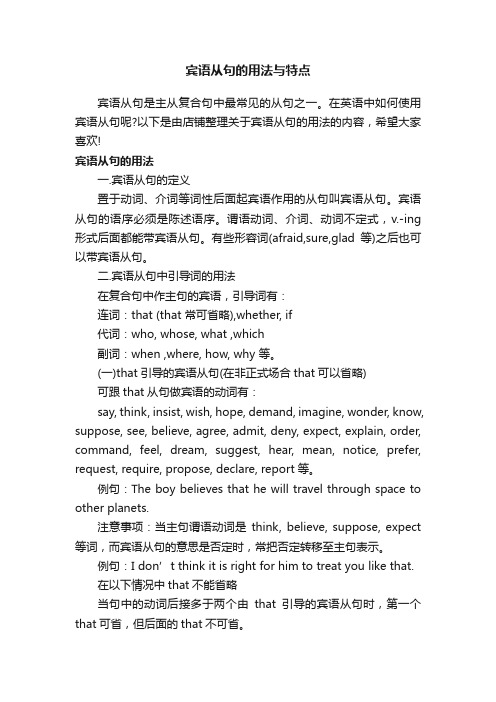
宾语从句的用法与特点宾语从句是主从复合句中最常见的从句之一。
在英语中如何使用宾语从句呢?以下是由店铺整理关于宾语从句的用法的内容,希望大家喜欢!宾语从句的用法一.宾语从句的定义置于动词、介词等词性后面起宾语作用的从句叫宾语从句。
宾语从句的语序必须是陈述语序。
谓语动词、介词、动词不定式,v.-ing 形式后面都能带宾语从句。
有些形容词(afraid,sure,glad等)之后也可以带宾语从句。
二.宾语从句中引导词的用法在复合句中作主句的宾语,引导词有:连词:that (that 常可省略),whether, if代词:who, whose, what ,which副词:when ,where, how, why 等。
(一)that引导的宾语从句(在非正式场合that可以省略)可跟that从句做宾语的动词有:say, think, insist, wish, hope, demand, imagine, wonder, know, suppose, see, believe, agree, admit, deny, expect, explain, order, command, feel, dream, suggest, hear, mean, notice, prefer, request, require, propose, declare, report等。
例句:The boy believes that he will travel through space to other planets.注意事项:当主句谓语动词是think, believe, suppose, expect 等词,而宾语从句的意思是否定时,常把否定转移至主句表示。
例句:I don’t think it is right for him to treat you like that.在以下情况中that不能省略当句中的动词后接多于两个由that引导的宾语从句时,第一个that可省,但后面的that不可省。
什么是宾语从句
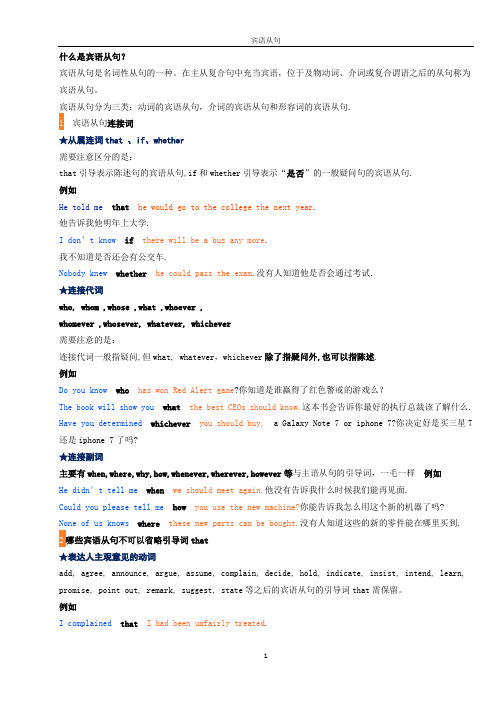
什么是宾语从句?宾语从句是名词性从句的一种。
在主从复合句中充当宾语,位于及物动词、介词或复合谓语之后的从句称为宾语从句。
宾语从句分为三类:动词的宾语从句,介词的宾语从句和形容词的宾语从句.1宾语从句连接词★从属连词that 、if、whether需要注意区分的是:that引导表示陈述句的宾语从句,if和whether引导表示“是否”的一般疑问句的宾语从句.例如He told me that he would go to the college the next year.他告诉我他明年上大学.I don’t know if there will be a bus any more.我不知道是否还会有公交车.Nobody knew whether he could pass the exam.没有人知道他是否会通过考试.★连接代词who, whom ,whose ,what ,whoever ,whomever ,whosever, whatever, whichever需要注意的是:连接代词一般指疑问,但what, whatever,whichever除了指疑问外,也可以指陈述.例如Do you know who has won Red Alert game?你知道是谁赢得了红色警戒的游戏么?The book will show you what the best CEOs should know.这本书会告诉你最好的执行总裁该了解什么. Have you determined whichever you should buy, a Galaxy Note 7 or iphone 7?你决定好是买三星7还是iphone 7了吗?★连接副词主要有when,where,why,how,whenever,wherever,however等与主语从句的引导词,一毛一样例如He didn’t tell me when we should meet again.他没有告诉我什么时候我们能再见面.Could you please tell me how you use the new machine?你能告诉我怎么用这个新的机器了吗?None of us knows where these new parts can be bought.没有人知道这些的新的零件能在哪里买到.2哪些宾语从句不可以省略引导词that★表达人主观意见的动词add, agree, announce, argue, assume, complain, decide, hold, indicate, insist, intend, learn, promise, point out, remark, suggest, state等之后的宾语从句的引导词that需保留。
宾语从句讲解及练习

A. what B. how C. whether D. where
9. Could you tell me _________ the radio without any help?
A. how did he mend B. what did he mend C. how he mended D. what he mended
10. I want to know _________.
A. whom is she looking after B. whom she is looking
C. whom is she looking
D. whom she is looking after
11. Do you know where _________ now?
② 在介词之后用whether。如: I'm interested in whether he likes English.我关心的是他是否喜欢英语。 ③ 在不定式前用whether。如: He hasn't decided whether to visit the old man.他尚未决定是否拜访那位老人。 ④ whether置于句首时,不能换用if。如: Whether this is true or not, I can't say.这是否真的我说不上来。 ⑤引导主语从句和表语从句时宜用whether。如: Whether she will come or not is still a question.她是否能来还是个问题。 ⑥ 若用if会引起歧义时,则用whether。如: Please let me know if you like the book.可理解为: a. Please let me know whether you like the book.请告诉我你是否喜欢这本书。 b. If you like the book, please let me know.你如果喜欢这本书,请告诉我。 * 疑问词:如果宾语从句原来是特殊疑问句,只需用原来的特殊疑问词引导。 如: Could you tell me why you were late for the meeting this morning?
中考英语知识点:一般疑问句充当宾语从句
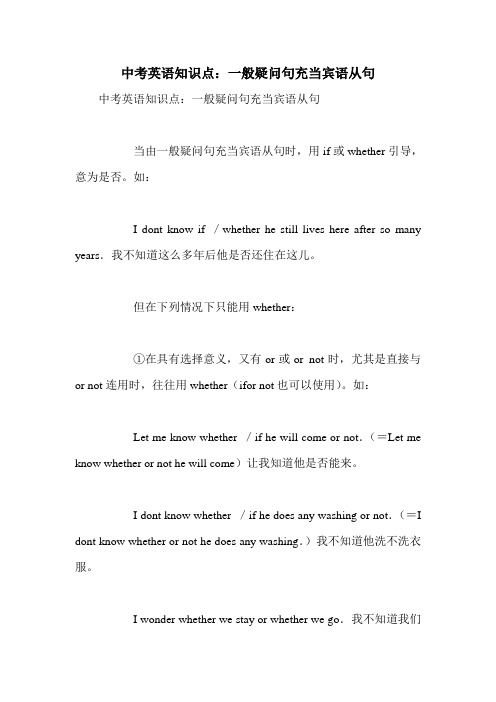
中考英语知识点:一般疑问句充当宾语从句中考英语知识点:一般疑问句充当宾语从句当由一般疑问句充当宾语从句时,用if或whether引导,意为是否。
如:I dont know if /whether he still lives here after so many years.我不知道这么多年后他是否还住在这儿。
但在下列情况下只能用whether:①在具有选择意义,又有or或or not时,尤其是直接与or not连用时,往往用whether(ifor not也可以使用)。
如:Let me know whether /if he will come or not.(=Let me know whether or not he will come)让我知道他是否能来。
I dont know whether /if he does any washing or not.(=I dont know whether or not he does any washing.)我不知道他洗不洗衣服。
I wonder whether we stay or whether we go.我不知道我们是去还是留。
②在介词之后用whether。
如:Im interested in whether he likes English.我关心的是他是否喜欢英语。
Were thinking about whether we can finish the work on time.我们正在考虑是否能按时完成这项工作。
I worry about whether I hurt her feelings.我担心是否伤了她的感情。
③在不定式前用whether。
如:He hasnt decided whether to visit the old man.他尚未决定是否拜访那位老人。
I dont know whether to go.我不知去否。
宾语从句讲解
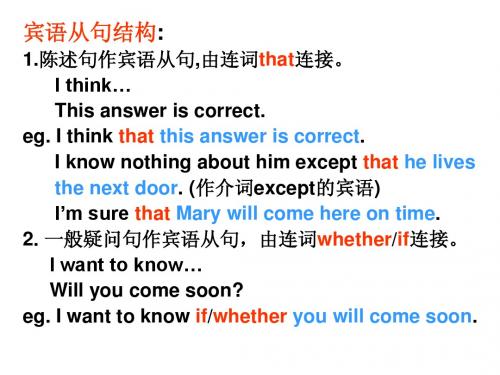
1.陈述句作宾语从句 由连词 陈述句作宾语从句,由连词 连接. 陈述句作宾语从句 由连词that连接. 连接 I think… This answer is correct. eg. I think that this answer is correct. I know nothing about him except that he lives the next door. (作介词 作介词except的宾语 的宾语) 作介词 的宾语 I'm sure that Mary will come here on time. 2. 一般疑问句作宾语从句,由连词 一般疑问句作宾语从句,由连词whether/if连接. 连接. 连接 I want to know… Will you come soon? eg. I want to know if/whether you will come soon.
如果宾语从句表示的是一般真理 注:1)如果宾语从句表示的是一般真理,就不受 如果宾语从句表示的是一般真理, 时态呼应的限制. 时态呼应的限制. eg. The teacher said the earth goes round the sun. 2)Could you tell me…是表示"请示"的较 是表示" 是表示 请示" 委婉的句型, 并不表示过去时间, 委婉的句型,could并不表示过去时间,所以 并不表示过去时间 其后的宾语从句的时态不受影响. 其后的宾语从句的时态不受影响. eg. Could you tell me where the meeting will be held?
�
I was surprised at… What had he done? eg. I was surprised at what he had done. 标点由主句来定. 注:标点由主句来定.
- 1、下载文档前请自行甄别文档内容的完整性,平台不提供额外的编辑、内容补充、找答案等附加服务。
- 2、"仅部分预览"的文档,不可在线预览部分如存在完整性等问题,可反馈申请退款(可完整预览的文档不适用该条件!)。
- 3、如文档侵犯您的权益,请联系客服反馈,我们会尽快为您处理(人工客服工作时间:9:00-18:30)。
know.
if / anted to know _______ the train a_r_r_i_v_e_
on time.
2. Did Peter come here yesterday? Li Lei wants to know.
Li Lei wants to knowif__/ _w_h_e_t_h_e_r Peter __c_a_m__e___ here yesterday.
2.Could you tell us ________ Mr. Brown _______ living in China?
3.I hoped he ______ (come) back in a week.
4.Please tell me if she ______(come) again next time.
Complete the sentences.
1. 我们不知道我们能否在火星上种植植物。 We don’t wonder___w_h_e_t_h_e_r_/_i_f_w__e_c_a_n__ __g_r_o_w__p_la_n_t_s___ on Mars.
2. 你能告诉我是不是有许多人打算搬到火星 上去吗? Could you tell me _if__/ _w_h_e_t_h_e_r_m__a_n_y_p_e_o_p_l_e __a_r_e_g_o_i_n_g_t_o__m_o_v_e__ to Mars?
(主句在前,从句在后加if/whether, 从句在 前,主句在后则加whether)
一般疑问句变宾语从句的步骤: ed1、把句子变为肯定陈述句
1. Is Jim at home? d(dido you know)
Jim is at home.---
2. Is June a good time to visit Hong Kong?( he asks)
4. Will they play basketball after school? ( He asked…)
He asked whether they would play basketball after school.
改为含宾语从句的复合句
1. Will the train arrive on time? I wanted to
A. will come; will be B. comes; is C. will come; is D. comes; will be
( )3. ______ Guangzhou tomorrow, do you know? (2011肇庆) A. Whether they leave for B. Whether will they leave for C. If they leave for D. If they will leave for ( )4. I wonder ________ or not you could go with me. (2011江西省)
• 8. I’d like to know _____ or not. A. whether will he come B. whether has he come C. whether he will come D. if he will come
1. Does Mr. Brown enjoy living in China? Co uld you tell us?(改写句子)
发现规律:
• 1.Bill thinks that the races were not that interesting to watch.
• 2.Mary thinks that teams were fantastic. • 3.Bob and Ben hope that they will be high
A. if B. when C. that D. whether
( )5.—Do you think _____ Xiao Ming can pass
the high school entrance exam or not?
If 1.—如S果or,ry引, I导’ve条n件o i状de语a. 从(20句11,广主西将百从色现) 。
( )1. —Do you know _______ tomorrow? —Sorry, I don't know. You may surf the
Internet. (2011湖南湘潭) A. whether will it rain B. if it will rain C. whether does it rain
next month. 能够做句子宾语的都有哪些?
4.Ben thinks that they will win the football game. 5.I wonder whether you will come back next month.
• 宾语从句:整个句子作宾语,用在 谓语动词后,叫做宾语从句。
Kong? ( He wondered…) He wondered whether/ if June was a good time to visit Hong Kong.
3. Does he like sports? ( Do you know…)
Do you know whether he likes sports?
( )2. —Mary, could you tell me if your mother ____ to our school sports meeting tomorrow? —I think she will come to school if she _____ free.(2011山东滨州)
I don’t think that they are fun to watch. 2. I believe April is the hottest month of the year.
I don’t believe April is the hottest month of the year.
• 1. Linda makes mistakes in spelling. • 2.He likes dancing. • 3.It is a fine day. • 4.He will go to Beijing for a vacation. • 5. Tina is working on the computer these
school students next year. • 4.Bill and Mary believe that they will be
back next year to watch the races.
宾语从句的结构:
主句 +连 接 词 +从句
said
把下列句子变成宾语从句
hoped
• The Water Festival is a great day. (Ben ththionukghst)
A. that
B. which
C2..是if 否,引导宾语D从. w句h,eth根er据需要确定时态。
( ) 6. I don't know if Mr. Wang ____on a field
trip. If he ___ on a field trip tomorrow, please call me.
June is a good time to visit Hong Kong.
3. Does he like sports?(My teacher wwoonndderesr)ed
He likes sports.---
4. Will they play basketball after school?(My father
wwoonnddeerrse) d
They will play basketball after school.
把下列各句变为宾语从句 1. Is Jim at home? (I wonder…)
I wonder whether / if Jim is at home. 2. Is June a good time to visit Hong
3. ____If____ that is true, what should we do?
4. _W__h_et_h_e_r_ they will ever become future Olympic champions only time will tell.
把下列宾语从句变为否定句。 1. I think that they are fun to watch.
第二步:if/ whether he is a student
加连接词 if/ whether. 第三步:Alice wonders if/ whether he is a student.
/Whether he is a student Alice wonders. 把主句,连接词,从句连接起来。
Complete the sentences with if / whether.
1. Uncle Wang came up to see i_f_/_w__h_e_t_h_e_rthere was anything wrong with the machine.
2. The shop keeper asked my father _w_h_e_t_h_e_r_ or not he wanted to choose a big Christmas tree.
宾语从句
Made By: Wang Lihui
认识句子成分
•1. I have a football. •2. He likes singsing. •3. Tom wants to go shopping. •4.Ben thinks that they will win the
